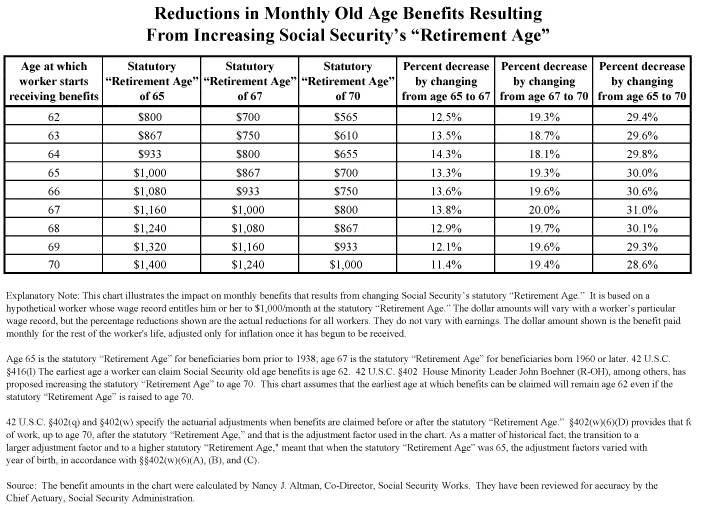Nancy Altman, Guest Blogger
NCPSSM Foundation Board member, Social Security Works Co-Director and Author, “The Battle for Social Security: From FDR?s Vision to Bush?s Gamble”
Despite its name, Social Security?s statutorily-defined ?Retirement Age? has nothing to do with when people must or can retire. It is most accurate to think of Social Security as having a band of retirement ages. Benefits are adjusted depending on the age a worker chooses to begin to receive benefits, whether that age is age 62, age 70, or some age in between.If there were no adjustment, benefits claimed at earlier ages would be more valuable because they would be received for a longer time. The adjustments are as close as the actuaries can come to ensuring that the benefits have the same overall value, taking into account when a worker begins to receive them.Because of these actuarial adjustments, raising the ?Retirement Age? is indistinguishable from a substantial across-the-board benefit cut. Currently, ?Retirement Age?, which until 2000 was age 65, is gradually being increased to age 67. If Minority Leader John Boehner has his way, the ?Retirement Age? will increase to age 70. The chart below illustrates the impact of the current-law increase to age 67, and the proposal to increasethe ?Retirement Age? to age 70.
(You can also see the full-size chart here)
As the chart reveals, theincrease in the?Retirement Age? from age 65 to age 67, by itself, amounts to about a 13 percent cut in monthly benefits A worker aged 62 who would be eligible for $800a month, if the ?Retirement Age? were age 65, will receive only $700 a month, once the ?Retirement Age? is age 67. That same worker who waited until age 70 would receive $1400 a month if the ?Retirement Age? were age 65, but only $1240 a month, once the ??Retirement Age? is age 67.If the statutory ?Retirement Age? were increased to age 70, that change would constitute another 19 percent cut in benefits, for a total of around 30 percent. That same worker who would have received $800 a month, if the ??Retirement Age?? were age 65, would receive only $565 a month, if the ?Retirement Age? were age 70. If that same worker chose to wait until age 70, he or she would receive $1400 a month if the ?Retirement Age? were age 65, but only $1000 a month, if the ?Retirement Age? were age 70.Instead of the misleading debate over what the ?Retirement Age? should be, I believe we should be debating what we think an appropriate and affordable benefit should be. The average monthly benefit received by all beneficiaries is $1054 or $12,648/year. Given how low Social Security?s average benefit is, and the trillions of dollars that have been lost in 401(k) plans and home equity, we should be discussing raising Social Security, not cutting it further!



